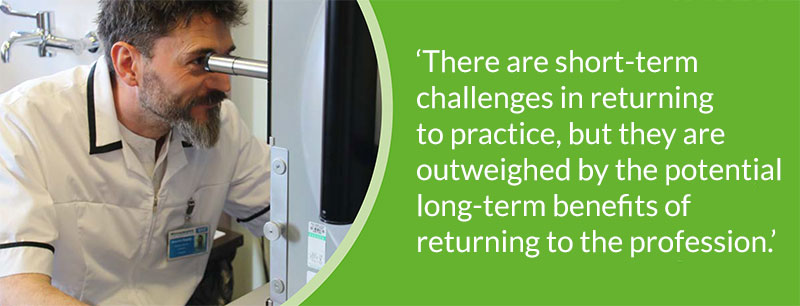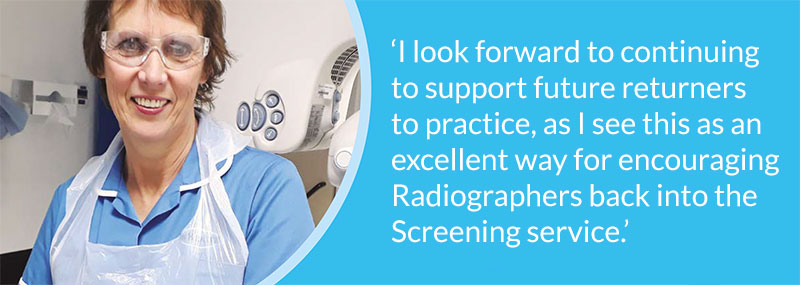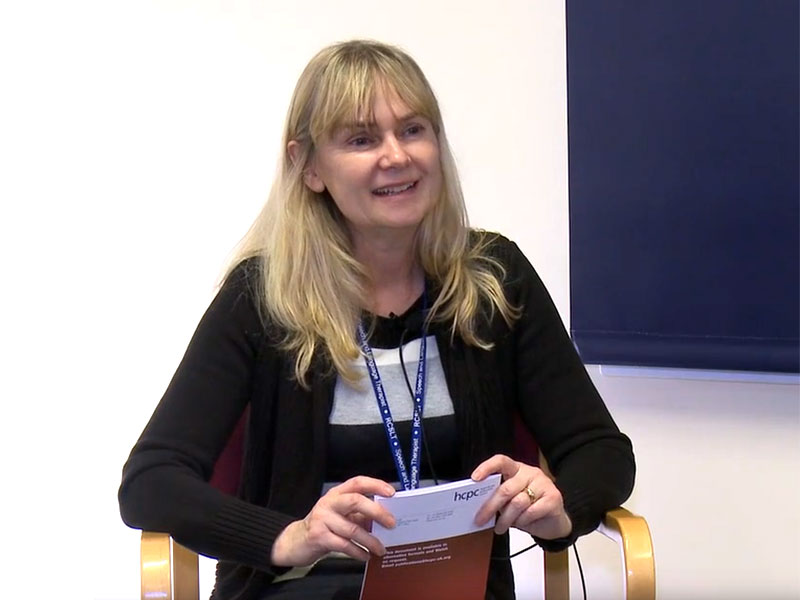As a physiotherapist and former service manager, I understand the pressures managers and employers face today
They need to ensure they have enough highly skilled professionals to ensure their workforce can deliver care across our health, educational and social care sectors.
This is even more critical with the publication of the NHS Long Term Plan in January 2019. Successful delivery of the plan requires a well-trained, highly experienced workforce, including HCPC registrants.
We know there are workforce supply issues affecting a number of HCPC professions. Although there is extensive work underway in the UK to attract new cohorts of students and therefore increase workforce numbers, this alone is not going to increase the numbers quickly enough.
So as we wait for these students to be trained and gain experience, what other solutions do we have?

Supporting an untapped resource
Throughout my career, I have seen many colleagues leave the profession.
The good news is some want to return. The HCPC has guidance to support those returning to practice and many individuals follow the guidance with great success. Professional bodies are also encouraging and supporting former members to return.
But as employers, do we make it easy for them? Not always.
Here we have an untapped resource. We should be proactively seeking them out and, more importantly, welcoming them with open arms when they knock on our doors to return.
Many want to return, but not all do
Since April 2016, I’ve been fortunate enough to be involved with a programme of work at Health Education England as we attract former HCPC registrants to return to the Register and back into practice.
This programme has received over a thousand enquiries. Of those, more than 325 have successfully returned to the Register and been employed back into the sector so far.
The great thing about the programme is that organisations are reaping the benefits of previously skilled individuals returning to practice in an average of 5 months.
But this is not the case for all, as some returners struggle to achieve their goal.
So, what are the challenges facing our returners?
Regardless of the time you’ve spent away, deciding to return to your chosen profession can be daunting.
Data from the HEE programme shows the average length of time former registrants are away from practice is 9 years, although we do have examples of returnees being away much longer.
I constantly say, ‘Returning to practice is not rocket science.’ But for returners it can feel like they are climbing a mountain pass on foot with the odd roller coaster thrown in along the way.
We have great examples of proactive employers supporting returners to undertake supervised practice, but still have some way to go to encourage more employers to engage. I think some employers lack understanding of the experience these individuals have to offer.

Refreshing skills, rebuilding confidence
The HCPC return to practice guidance gives returnees up to a year to update their skills and knowledge over minimum number of days.
How they decide to do this is up to them. They can use formal and private study, but the most popular element is supervised practice, where they work alongside a registrant from their profession.
Returnees see supervised practice as essential in allowing them to understand how and what has changed in their profession whilst they were away. It allows them to apply their learning from formal and private study, but most importantly rebuild their confidence.
What’s in it for us?
Look at all returnees as an asset.
On average, returnees had 8 years’ clinical experience before they left, with most working as seniors in specialist areas. Is that experience our current cohort of students can bring when qualifying?
Okay, some have never practised since qualifying, therefore may need extra time and support.
But supervised practice should not be seen as re-training. The returnee is responsible for their updating. They are not students or trainees, but qualified professionals managing a period of updating of their skills and knowledge.
The problem is they do not know what they do not know and require support and guidance from us – a chance to get back on the bike.
How do I know they are competent?
It is the responsibility of the returner to provide evidence to the HCPC when submitting their forms.
The supervising practitioner is not signing to say they are competent, but only to confirm supervised practice has been undertaken. The supervisor is not held responsible should fitness to practice be brought into question later.
Therefore, to provide assurance to your organisation, you could suggest the returner uses any competency or preceptorship frameworks. This is also evidence for the returnee to submit.

How can they help us?
Lack of capacity is a common reason expressed for not supporting returnees.
The current demands on our service are not going away and our capacity will not increase in the short term.
Although not registered, our returnees are qualified, therefore don’t require the supervision students need. They could provide capacity and support, even use their past experience to run sessions with students.
Remember they will also be checking you out – will you be their employer of choice once they are on the Register again? Most returners will live close to your organisation and be looking for local work. Your openness and willingness to help could make the difference.
How can we help them?
Link up with your HR department and look at setting up processes that ensure they can start as quickly as possible. Employment is not necessary for supervised practice. Bring them in under honorary contracts and look at their supervised period as an opportunity to see how they could fit into your service once back on the Register.
Health and care professionals will always want to return to practice. It can only be made easier if we give them a lift up their mountain pass and remove those roller coasters.
With pressure on service delivery, why not help to return a HCPC registrant back to practice? Your service, organisation and the population can only benefit from this untapped resource.


